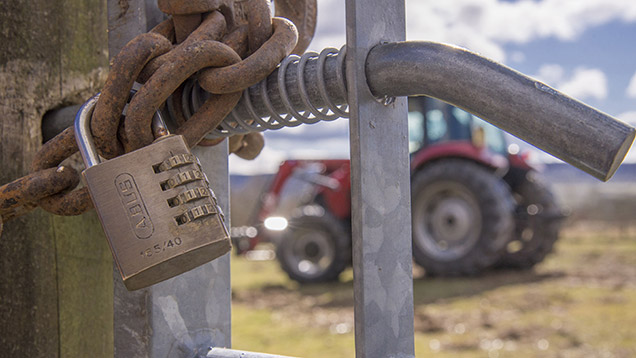Scottish police force under fire over handling of farm crime
 © FLPA/John Eveson/REX
© FLPA/John Eveson/REX Scotland’s new centralised police force has come under fire in the Scottish Parliament for its lack of progress in solving farm crime which costs the Scottish industry almost £2 million a year.
In written evidence to today’s (Tuesday 24 February) Scottish Parliament’s Justice Committee meeting, NFU Scotland (NFUS) said they had a good relationship with Police Scotland.
See also: Rural riders help combat countryside crime
However, they said many members found the force’s centralised call-handling and lack of local knowledge often led to very slow response times and reports of local crimes not being linked up between police colleagues.
Giving evidence to the committee in person, NFUS Legal and Commercial committee chairman Jamie Smart told MSPs: “We find that handlers in control rooms don’t know where we are.
“When we say sheep have been stolen from The Haugh it means nothing to a control room person in Edinburgh – that’s where we’ve lost contact. People don’t know where we are.”
Financial losses
The union also criticised the Scottish Court Service and said some members believed it didn’t take the financial losses associated with rural crime seriously enough.
“Even with evidence, the conviction success rate is poor or the penalty is not severe enough to act as a deterrent,” the NFUS submission stated.
“Whilst NFUS members generally appreciate that police resources are stretched, time and again members will express frustrations that police know who the perpetrators of rural crimes are yet do not have the power nor resource to take proactive action to stop it happening again.”
One force
However, Detective Chief Superintendent Robbie Allan refuted the criticism and told MSPs that there was now a more coordinated central support which meant that intelligence was shared across all regions.
And he added that when it came to evidence gathering, the local response on the ground had not changed whether it was in the Highlands, Perthshire or Strathclyde.
“It is easier with one force. We have good links to the north-east and north-west in England. Criminality travels up and down across the border and this is an area we are improving greatly because of that linkage,” he said.
Threats
Mr Smart told the committee that intimidation by criminals had become a serious issue for farmers and said he had personally been threatened on his own farm, which is just half a mile from the nearest town.
“It was a wildlife crime. I was challenged and told that if I reported it I would have a large fire in a shed. It was terrifying, because you can’t put a fence round everything. I showed him my phone as I dialled 999, however it was a big worry for me and my family for the next few weeks.”
NFU Scotland’s evidence to the Scottish Parliament’s Justice Committee included:
Theft
The most common items targeted by thieves in Scotland over the last 12 months were quad bikes, tools and fuel such as domestic heating oil and farmers’ supplies of ‘red’ diesel.
Although high-value thefts may be planned and highly organised, the number of stolen garden tools and ornaments indicates opportunist thieves continue to target gardens and outbuildings
Livestock rustling
NFU Mutual have identified livestock rustling as an emerging crime across the UK, with over 4,200 animals reported in Scotland in 2013.
It is understood that high meat prices and improved security on farm vehicles could be leading to a resurgence in instances of livestock rustling
Based on claims reported by farmers, NFU Mutual estimates that over 90,000 sheep, cattle and pigs could have been stolen in the UK during 2013 and that in total, when other insurance company customers and non-insured losses are taken into account rustling could have cost UK farmers over £6.5m in 2013.
Costs increasing
NFU Mutual suggest that the cost of rural crime increased in Midlothian, Ayrshire, Inverness-shire, Fife, and Dunbartonshire between 2012 and 2013. A year-on-year increase was also recorded in Perthshire, Clackmannanshire and Banffshire in this time.
